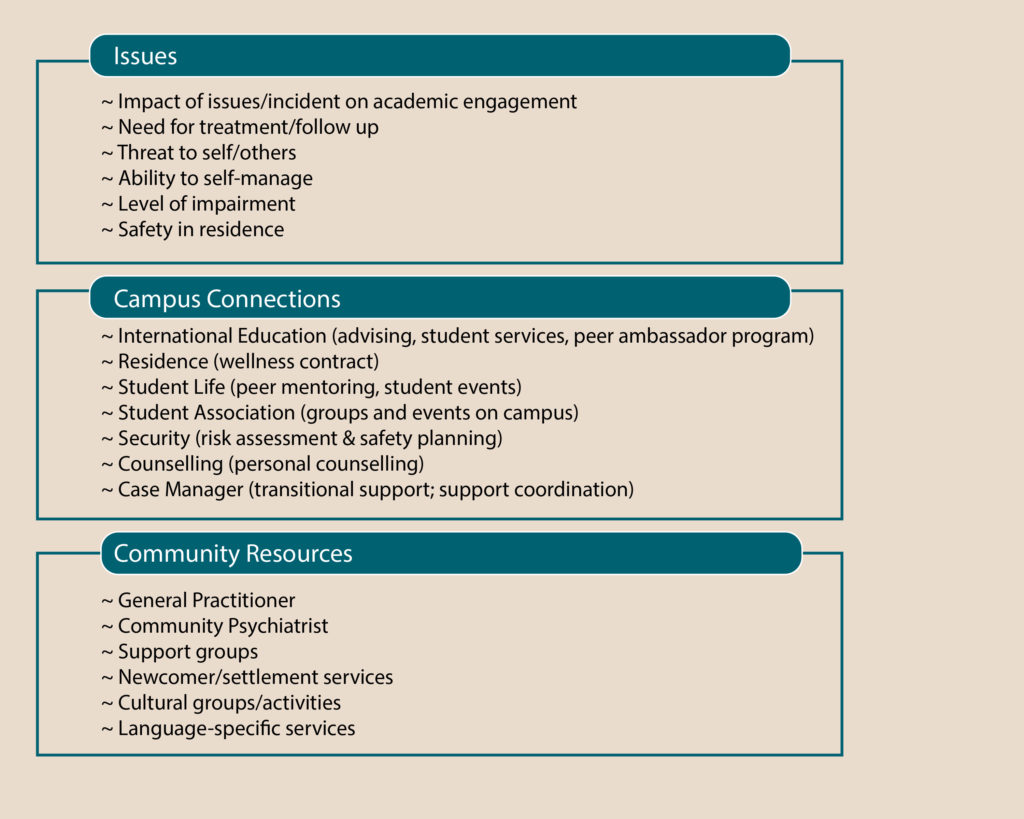David’s Story
This story showcases a Case Management approach to supporting student mental health.
Student Profile
David is a 20 year old student, in his second semester of computer systems technology. He is an international student and is in good academic standing.
Presenting Concern
David has recently experienced a intimate relationship breakup and a loss of his social circle. Even though David has a history of depression, he is not currently on medication. He was hospitalized three years ago and does have a prior incident at residence involving alcohol. David is currently experiencing thoughts of suicide and has increased his alcohol use.
Background Story
Emergency services are called to Residence at 11:00 pm on a Saturday when a resident discloses to an RA that his roommate, David, is behaving erratically and expressing thoughts of suicide following a night of heavy drinking. David, a 20-year old male international student enrolled in Semester 2 of the Computer Systems Technology program, spends four days in hospital and is discharged with a diagnosis of substance-induced psychotic episode, adjustment disorder and alcohol abuse.
Prior to this incident, David had one substance use-related infraction stemming from an incident at a party in Residence six months prior. He received an educational sanction and was required to meet with the Residence Life Coordinator. David opted to complete the Check Your Drinking program online. David reported that he was hospitalized for a major depressive episode over three years ago but had since recovered. He stated that he was doing well up until two weeks ago, when his girlfriend broke up with him and he lost most of their mutual friends. He started drinking in order to cope with feelings of loss and social isolation. His increased alcohol use has impacted his school attendance.
The case manager met with David in hospital and worked with him and his inpatient team to develop a discharge plan, which included a referral to a substance use treatment group. As David did not have a psychiatrist or family physician, the inpatient psychiatrist agreed to see David in the outpatient clinic until he could be connected to community psychiatry.
The Case Management Working Group met to develop a case coordination plan. Upon discharge, Security and the Case Manager met with David to conduct a risk assessment and collaboratively develop a safety plan to ensure adequate supports were in place for his return to campus.
David returned to Residence, where he received support through his RA and the Residence Life Coordinator to become more engaged in Residence activities. The Case Manager helped connect David to primary care and a community psychiatrist through a partner CHC provider and referred him to a transitional age youth case management program. Transitional case management support was provided in the interim. David declined the referral to the substance use treatment group, though he did agree to meet with the Residence Outreach Counsellor weekly to explore relationship issues and coping strategies. International Education facilitated the submission of David’s health insurance claims; liaised with faculty to accommodate missed assignments and endorsed David’s application to the Peer Ambassador program.
First Point of Contact
David’s first point of contact was through residence life on campus.
Carepath

Treatment Plan
Follow up support

Campus-Community Partnerships
International Education has partnered with Catholic Crosscultural Services (CCS) to pilot International Student Connect, a program funded by the Ministry of Citizenship, Immigration and International Trade to identify and develop an appropriate service response to the settlement needs of postsecondary international students in Ontario. CCS runs seminars on various settlement topics identified by students and acts as a link to other ethnocultural-specific community services.
Centennial College is developing a partnership with Scarborough Centre for Healthy Communities, a local Community Health Centre, to provide primary healthcare services on campus (nurse practitioner, smoking cessation, sexual health) and link students to community psychiatry.
Key Considerations
The Case Manager conducts a comprehensive assessment which includes, but is not limited to:
- Global assessment of functioning
- Academic history and current standing
- Existing formal and informal supports
- Coping skills/resilience, self-management skills
- Financial resources (including health insurance coverage)
- Student’s perception of needs and support preferences


